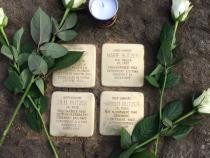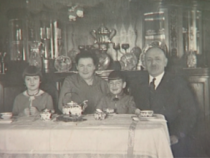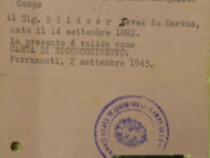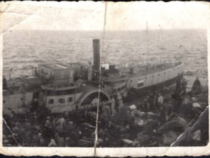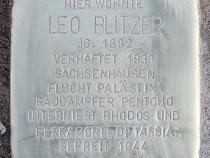Location
Alexanderstraße 43
District
Mitte
Born
14 September 1892 in Chrzanów
Escape
Am 30. April 1940
Verhaftet
March 1942 to 14 September 1943
in
Ferramonti di Tarsia (Kalabrien)
Deportation
on 13 September 1939
to
Sachsenhausen
Survived
01 November 1961 in Genua/Italien
Leo Blitzer was born on 14 September 1892 in the small Polish town Chrzanóv. His wife Marie née Weber was born two months later on 8 November 1892 in Krakow. They were married on 30 January 1921 in Berlin, where Leo had been living since 1920. Their daughter Lilli was born in the summer of the following year on 11 July 1922 and their son Harold on 9 August 1926. Harold later described his family as a typical, modern Jewish household which was not kosher but where the religious festivals were celebrated in the traditional fashion.
From 1922 to 1933 the Blitzer family lived at 89 Kastanienallee, where Leo ran a goose and poultry business. After a few years he opened a second shop at 141 Schoenhauser Allee. Business was so good that Leo closed the two shops in 1933 and opened new and much larger premises at 137 Schoenhauser Allee. In the winter months he ran the poultry business with two or three assistants and sold ice cream there in summer with the help of his wife. Harold later stated that he thought that the new shop was a big mistake, but Leo was of the opinion that nothing could happen to them, as on account of their well-known liver paté, some of their best customers were high-ranking SA members.
From 1933 onwards, the family began to feel the effects of the racist discrimination of the Jews. As a result of the boycot of Jewish businesses, gentile customers stayed away and, according to Leo, his takings went down by half. In 1935, the family moved to 57 Schoen-hauser Allee. In the same year, Leo relates, the Polish poultry exports were stopped and his income was again drastically reduced. At the beginning of 1937 he was forced to sell his business. In order to feed his family he begann to trade in cloth remnants, which he sold to textile firms to earn a living.
The discrimination of the Jews did not only affect the Blitzer family's financial situation; it changed their whole way of life. Harold reported that he did not experience any form of anti-semitism before 1932, whereas by 1934 Jews could no longer go to the cinema, the theatre or to cafés. In 1937 Harold had to leave his old school after being intimidated by both teachers and fellow pupils. He then attended a Jewish school.
From 1938 onwards the situation of the German Jews deteriorated dramatically. The Blitzer family was now living at 43 Alexanderstrasse. In the so-called „Poland action“ on the night of 28 October 1938, thousands of Polish Jews in Berlin and other cities were arrested and expelled to the Polish border. According to Harold, Lilli, who was a Polish citizen, was arrested on the street and banished to Poland, where relatives looked after her. Harold, Leo and Marie were not expelled. As a result of the persecution, Leo begann to plan their emigration. He sold the family's furniture, which was worth 7,000 Reichsmark, piece by piece and made only 350 RM.
At the beginning of the war in September 1939, the men among the approximately 40,000 Jews who had remained in Germany were arrested and taken to concentration camps. Leo was one of them. He was arrested on 13 September 1939 and taken to Sachsenhausen where he was severely maltreated. Marie succeeded in obtaining emigration papers for him, as a result of which he was released on 23 December 1939 with the injunction to leave the country within 30 days. Around the same time the family received the news that Harold had been selected for a children's transport and would be able to leave for Denmark on 6 February 1940. At the end of January, Lilli unexpectedly returned from Poland. She and a friend had met a German policeman in Poland, whom they told that they were German tourists who had lost their papers. As they both spoke fluent German, the policeman believed them and took them back to Berlin in his lorry. And so in January 1940 parents and children were reunited. It was the last time they were together.
Leo left Berlin on 30 April 1940 for Bratislava, where he and 500 other Jews embarked on the Pentcho for Palestine. This was one of the many illegal transits run by the Slovakian branch of the zionist Batar organisation. Batar had purchased an old freighter and refurbished it to be more or less suitable for transporting human beings. It was ramshackle and unsafe and the voyage was long and complicated. On 9 October the ship's motor broke down and the passengers were stranded on the small, uninhabited Greek island of Kamilinosi in the Aegean. Two weeks later Italian ships took them to Rhodes where they were accommodated in tents in a stadium where they lived for nearly two years. At the end of March 1942 they were transfered to the Italian internment camp at Ferramonti di Tarsia in Calabria.
Leo described the internment camp on Rhodes as follows: „The camp was surrounded by a barbed wire fence, we were treated very badly there and anyone who attempted to escape was shot immediately. There was not enough food to go round.“ He added that the conditions in Ferramonti were similar. On 14 September 1943 the 2000 internees at Ferramonti were liberated by the British army. The camp at Ferramonti was the very first European concentration camp to be liberated by the Allies. As the war was not over, the internees did not know where to go. They left the camp alone or in small groups during the course of the next two years. Leo left in May 1944 and made his way to Palestine, where he lived in Tel Aviv. He found a part-time job as a shop assistent in a poultry business and later ran his own refreshments kiosk.
Leo's first wife, Marie, had been deported on 3 March 1943 to Auschwitz, where she was murdered. Leo married again on 27 December 1947. His business was not a financial success and his health was poor. His son Harold supported him and his new wife Shoshana Rosa financially.
Leo and Harold did not meet again until 1957, as neither had enough money for the fare.
Leo died on1 November 1961 in Genua of a heart attack.
From 1922 to 1933 the Blitzer family lived at 89 Kastanienallee, where Leo ran a goose and poultry business. After a few years he opened a second shop at 141 Schoenhauser Allee. Business was so good that Leo closed the two shops in 1933 and opened new and much larger premises at 137 Schoenhauser Allee. In the winter months he ran the poultry business with two or three assistants and sold ice cream there in summer with the help of his wife. Harold later stated that he thought that the new shop was a big mistake, but Leo was of the opinion that nothing could happen to them, as on account of their well-known liver paté, some of their best customers were high-ranking SA members.
From 1933 onwards, the family began to feel the effects of the racist discrimination of the Jews. As a result of the boycot of Jewish businesses, gentile customers stayed away and, according to Leo, his takings went down by half. In 1935, the family moved to 57 Schoen-hauser Allee. In the same year, Leo relates, the Polish poultry exports were stopped and his income was again drastically reduced. At the beginning of 1937 he was forced to sell his business. In order to feed his family he begann to trade in cloth remnants, which he sold to textile firms to earn a living.
The discrimination of the Jews did not only affect the Blitzer family's financial situation; it changed their whole way of life. Harold reported that he did not experience any form of anti-semitism before 1932, whereas by 1934 Jews could no longer go to the cinema, the theatre or to cafés. In 1937 Harold had to leave his old school after being intimidated by both teachers and fellow pupils. He then attended a Jewish school.
From 1938 onwards the situation of the German Jews deteriorated dramatically. The Blitzer family was now living at 43 Alexanderstrasse. In the so-called „Poland action“ on the night of 28 October 1938, thousands of Polish Jews in Berlin and other cities were arrested and expelled to the Polish border. According to Harold, Lilli, who was a Polish citizen, was arrested on the street and banished to Poland, where relatives looked after her. Harold, Leo and Marie were not expelled. As a result of the persecution, Leo begann to plan their emigration. He sold the family's furniture, which was worth 7,000 Reichsmark, piece by piece and made only 350 RM.
At the beginning of the war in September 1939, the men among the approximately 40,000 Jews who had remained in Germany were arrested and taken to concentration camps. Leo was one of them. He was arrested on 13 September 1939 and taken to Sachsenhausen where he was severely maltreated. Marie succeeded in obtaining emigration papers for him, as a result of which he was released on 23 December 1939 with the injunction to leave the country within 30 days. Around the same time the family received the news that Harold had been selected for a children's transport and would be able to leave for Denmark on 6 February 1940. At the end of January, Lilli unexpectedly returned from Poland. She and a friend had met a German policeman in Poland, whom they told that they were German tourists who had lost their papers. As they both spoke fluent German, the policeman believed them and took them back to Berlin in his lorry. And so in January 1940 parents and children were reunited. It was the last time they were together.
Leo left Berlin on 30 April 1940 for Bratislava, where he and 500 other Jews embarked on the Pentcho for Palestine. This was one of the many illegal transits run by the Slovakian branch of the zionist Batar organisation. Batar had purchased an old freighter and refurbished it to be more or less suitable for transporting human beings. It was ramshackle and unsafe and the voyage was long and complicated. On 9 October the ship's motor broke down and the passengers were stranded on the small, uninhabited Greek island of Kamilinosi in the Aegean. Two weeks later Italian ships took them to Rhodes where they were accommodated in tents in a stadium where they lived for nearly two years. At the end of March 1942 they were transfered to the Italian internment camp at Ferramonti di Tarsia in Calabria.
Leo described the internment camp on Rhodes as follows: „The camp was surrounded by a barbed wire fence, we were treated very badly there and anyone who attempted to escape was shot immediately. There was not enough food to go round.“ He added that the conditions in Ferramonti were similar. On 14 September 1943 the 2000 internees at Ferramonti were liberated by the British army. The camp at Ferramonti was the very first European concentration camp to be liberated by the Allies. As the war was not over, the internees did not know where to go. They left the camp alone or in small groups during the course of the next two years. Leo left in May 1944 and made his way to Palestine, where he lived in Tel Aviv. He found a part-time job as a shop assistent in a poultry business and later ran his own refreshments kiosk.
Leo's first wife, Marie, had been deported on 3 March 1943 to Auschwitz, where she was murdered. Leo married again on 27 December 1947. His business was not a financial success and his health was poor. His son Harold supported him and his new wife Shoshana Rosa financially.
Leo and Harold did not meet again until 1957, as neither had enough money for the fare.
Leo died on1 November 1961 in Genua of a heart attack.






